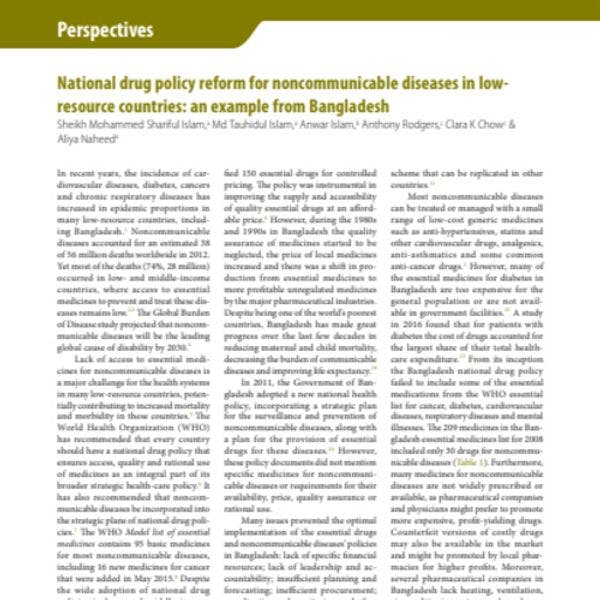Reforma de la política nacional de drogas para abordar las enfermedades no transmisibles en países con pocos recursos: un ejemplo de Bangladesh
La OMS explica que en los países de ingresos bajos y medianos no se ha prestado la atención suficiente al acceso a los medicamentos para luchar contra enfermedades no transmisibles. Más información, en inglés, está disponible abajo.
Suscríbase a las Alertas mensuales del IDPC para recibir información sobre cuestiones relacionadas con políticas sobre drogas.
In recent years, the incidence of cardiovascular diseases, diabetes, cancers and chronic respiratory diseases has increased in epidemic proportions in many low-resource countries, including Bangladesh. Noncommunicable diseases accounted for an estimated 38 of 56 million deaths worldwide in 2012. Yet most of the deaths (74%, 28 million) occurred in low- and middle-income countries, where access to essential medicines to prevent and treat these diseases remains low. The Global Burden of Disease study projected that noncommunicable diseases will be the leading global cause of disability by 2030.
Lack of access to essential medicines for noncommunicable diseases is a major challenge for the health systems in many low-resource countries, potentially contributing to increased mortality and morbidity in these countries. The World Health Organization (WHO) has recommended that every country should have a national drug policy that ensures access, quality and rational use of medicines as an integral part of its broader strategic health-care policy. It has also recommended that noncommunicable diseases be incorporated into the strategic plans of national drug policies. The WHO Model list of essential medicines contains 95 basic medicines for most noncommunicable diseases, including 16 new medicines for cancer that were added in May 2015. Despite the wide adoption of national drug policies in low- and middle-income countries, the majority of these do not include essential medicines for noncommunicable diseases.
Keep up-to-date with drug policy developments by subscribing to the IDPC Monthly Alert.
